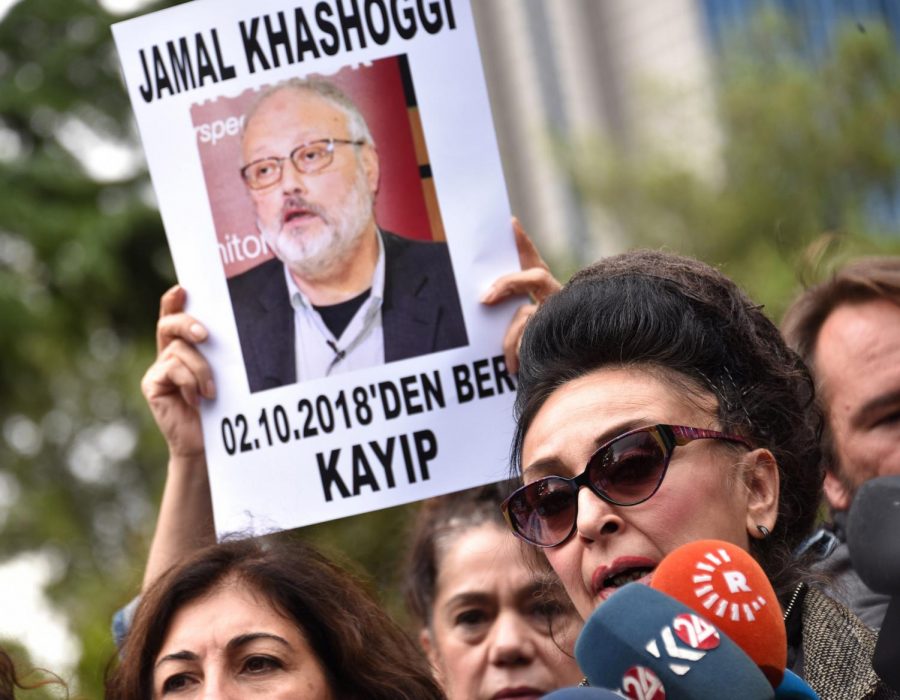The disappearance of Khashoggi
Opinion columnist Jack Ave discusses the recent murder of Jamal Khashoggi, and the U.S. needs to learn from this incident.
Oct 25, 2018
The disappearance of a prominent journalist and critic of the Saudi Arabian government has made internal news.
Jamal Khashoggi kissed his fiancé goodbye for the last time before entering the Saudi consulate in Istanbul, Turkey on Tuesday, Oct. 2 to obtain documents related to their upcoming marriage. While his fiancé stood outside, sources believe that Khashoggi was brutally beaten, murdered and dismembered shortly after his arrival.
Hatice Cengiz, Khashoggi’s fiancé, stood outside for almost twelve hours waiting for her partner to exit the consulate. Just as Khashoggi instructed if he were not to return, Cengiz contacted local authorities as well as government officials with ties to Khashoggi.
The Saudi Arabian government denied reports that Khashoggi had been harmed or involuntarily held at the consulate for nearly two weeks. Officials initially told Turkish police that Khashoggi had left through another exit.
However, authorities were able to obtain video-surveillance surrounding the compound, confirming that Khashoggi had not left.
As days passed since Khashoggi’s disappearance, Turkish media began to unveil disturbing details about his fate.
According to video footage, flight logs and local officials, 15 Saudi agents arrived in at the consulate in Turkey on the morning of Oct. 2, leaving several hours after Khashoggi’s disappearance.
While we do not know exactly what happened behind the walls of the Saudi consulate, it was reported that the 15-person crew brought a bone-saw into the country. The crew arrived at the consulate without luggage, but left with several large bags. A member of the crew is also a doctor who specialized in post-mortems.
These emerging details seemed to all but seal Khashoggi’s fate.
On Saturday, Oct. 20, Saudi Arabian officials confirmed that Khashoggi was dead. According to a statement from Saudi Arabia’s public prosecutor, Khashoggi engaged in a physical altercation with Saudi officials, which led to his accidental death.
Allies of the United States have come out and condoned the extra-judicial killing of Jamal Khashoggi. Many fear that the murder of an outspoken journalist signals a larger attack on the freedom of the press.
In the world of fake news, media distrust and political polarization, we must learn from this international incident. In the United States especially, our administration has removed protections for the press and our commander in chief labels unfavorable media as dangerous.
Christina Koningisor argues in the Yale Law Review that the current trend in American politics could lead to the censorship we’ve seen from the Saudi government. She writes that, “President Trump has engaged in a range of efforts to deny access to specific journalists or outlets as a form of political retaliation. He has also demonstrated substantial animosity toward the press more broadly. Such actions may damage the credibility of the press and undermine longstanding democratic traditions and norms. But they also raise the specter that these smaller threats are merely the precursors to more aggressive action against the press, such as the selective enforcement of laws criminalizing the publication of classified information or the selective subpoenaing of reporters as a means of silencing political dissent.”
Jamal Khashoggi’s last publication before his untimely death seemed hauntingly appropriate. He wrote that, “A state-run narrative dominates the public psyche, and while many do not believe it, a large majority of the population falls victim to this false narrative. Sadly, this situation is unlikely to change.”


















